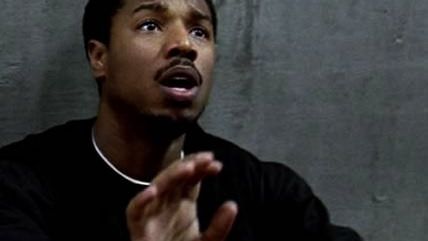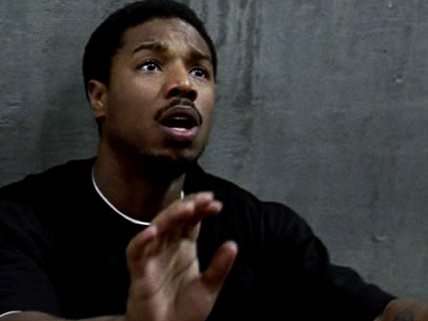Fruitvale Station
Michael B. Jordan offers a complex portrayal of Oscar Grant, who was killed by police.


Fruitvale Station, the directorial debut of Ryan Coogler, chronicles the last day of Oakland resident Oscar Grant, the 22-year-old who was shot in the back after he was laid face down on the concrete platform of BART's Fruitvale station early New Year's Day morning in 2009. Grant's death led to weeks of protests against police brutality and racism in the Bay area. Coogler, an Oakland native, was a graduate cinema student at USC at the time of the Grant shooting. He wanted to make a movie about Grant to, in his own words, get the "audience to get to know the guy."
In choosing, however, to focus on the last 24 hours of Oscar Grant's life, Coogler made it impossible for the audience to "get to know the guy." While Coogler used court documents and interviews with friends and family to inform his work, the narrative in Fruitvale Station is a dramatization. A scene where Grant witnesses the death by hit and run of a dog, for example, is completely fabricated, and it's difficult to tell whether other parts of the narrative are true to what happened, or merely true to what Grant's friends and family say or believe happened. To Coogler's credit, despite this, Michael B. Jordan's performance as Oscar Grant does not come off as artificially sympathetic. Grant is presented as a complex character, a man who seems generally to want to do good but who has obvious character flaws. Early on in the film, Grant is outed by his girlfriend (and mother of his child) as a philanderer, and on several occasions serious anger management issues are evident. Grant was a troubled person, and Coogler doesn't shy away from that.
Perhaps more importantly, Grant is shown to be someone who was already a victim of state violence before he was ever shot on a subway platform. While the film takes place in the last 24 hours of Grant's life, there's an important flashback. Grant has lost his job a few weeks before the events in the film, but has not yet told his girlfriend. He goes down to the coast to sell an ounce of marijuana to an acquaintance. He decides not to, dumping the weed into the ocean as he reflects on his last time in prison: when his mother, visiting him behind bars, tells him his daughter asked why he loved "going on vacation" (the excuse given to her for Grant's involuntary absence) more than he loved her. It's a powerful moment, and certainly illustrates why Grant makes the decision to dump several hundred dollars' worth of marijuana instead of selling it when he has serious money problems. Losing his job at the fish market jeopardized his ability to care for his daughter and her mother, but selling drugs would also, by potentially sending him to jail, jeopardize his relationship with his child. But there is nothing natural about the latter danger; it is a product of an unjust law.
The real-life Grant spent two stints in prison, both drug-related. In that way, Grant was a victim of state violence before he ever stepped on the BART train car (which, incidentally, appears throughout the film, almost as a character of its own, a kind of harbinger of death).
The most disruptive characters in the movie are the police officers. They appear at Fruitvale station after a minor scuffle on the train involving Grant, his friends, and another group that gets away. By the time the cops arrive, the fight has already broken up on its own; the police begin immediately to demand respect for their authority. It is clear to the audience and to the passengers on the stopped train that at this point the police, not Grant or anyone else in the area, are the ones disturbing the peace. Grant knows his rights, repeatedly pulling out a cellphone to record the cops while they detain him and his friends. An off-hand comment he makes about the cops not having the power to arrest them because he and his friends did nothing wrong sends the police officers off the rails. It is perhaps the most realistic moment in the film; anyone who's dealt with cops long enough has seen that kind of behavior. And, indeed, one of the real-life cops involved in the incident admitted afterward that Grant and his friends would have been let off with merely a citation if they had complied—cop-speak for not asserting your constitutionally protected rights.
Instead, one of the cops decides he's had enough of Grant, who at this point they've already gotten face down on the ground. Instead of putting the handcuffs on him, he steps back to tase him into compliance. But the cop pulls out his firearm instead, shooting Grant in the back. The bullet ricochets off the floor and punctures one of Grant's lungs. Then the handcuffs went on. Eight hours later he is dead.
The encounter was completely unnecessary. No one at the station had expressed any desire to press charges against Grant. No one had claimed he assaulted them. He offended the police, and that cost him his life.
Incidents like Oscar Grant's may not make it into the news cycle often, but what's frightening about the film is that every part of Grant's encounter with police—their demands to have their authority respected, their casual brutality, their intolerance of someone exercising his constitutional rights, their excessive reliance on the use of force—happens somewhere in America each day.
Editor's Note: As of February 29, 2024, commenting privileges on reason.com posts are limited to Reason Plus subscribers. Past commenters are grandfathered in for a temporary period. Subscribe here to preserve your ability to comment. Your Reason Plus subscription also gives you an ad-free version of reason.com, along with full access to the digital edition and archives of Reason magazine. We request that comments be civil and on-topic. We do not moderate or assume any responsibility for comments, which are owned by the readers who post them. Comments do not represent the views of reason.com or Reason Foundation. We reserve the right to delete any comment and ban commenters for any reason at any time. Comments may only be edited within 5 minutes of posting. Report abuses.
Please to post comments


their demands to have their authority respected, ... their excessive reliance on the use of force
Every time I read "Fruitvale", I read it as "Furtive". Coincidence? I think not.
Go take an ink blot test. All kinds of stuff might be seen.
The bullet ricochets off the floor and punctures one of Grant's lungs. Then the handcuffs went on. Eight hours later he is dead.
Because when you realize you've accidentally shot the guy you were trying to taze, you first handcuff them before attempting to resuscitate.
When this incident first happened, I actually gave the cop the benefit of the doubt that it was a mistake... a tragic mistake with deadly consequences. But now, just throw his ass away for three decades into a dark hole.
" But now, just throw his ass away for three decades into a dark hole."
By dark hole, you mean paid administrative leave, right? We will make sure justice is served.
signed,
LA Police Chief William Bratton
Because when you realize you've accidentally shot the guy you were trying to taze,
From the officer's point of view, the correct adverb would be "successfully".
their intolerance of someone exercising his constitutional rights, their excessive reliance on the use of force?happens somewhere in America each day.
Try every hour.
Where's Wallace at, String? Where the kid at?
Michael B. Jordan is the black Sean Bean.
Well he survived Space Jam.
You mean he got to experience...
..?SPACE JAM?..
I don't like the reflexive anti-cop assumption in this review. Yeah, cops are sometimes authoritarian thugs, and, in this circumstance, it looks like the cops engaged in stasi behavior, and the whole pointless war on drugs adds to the tragedy. But, it's possible that everyone involved - cops and Grant - were out of control asshats. I need to read up on the incident prior to seeing the film.
The numerous cell phone videos of the original incident taken by other passengers are probably still on Youtube.
However "out of control" anyone was before this moment (subjective and debatable), Grant is proned on the ground with the cop in a clear position of physical dominance (standing over him) when the gun is fired. It's not even close to ambiguous whether the cop had a reasonable fear of needing to use a weapon.
It's pretty chilling to watch. A murder literally captured on video by several people.
At the moment Grant was shot, he was being held down prostrate by another cop. Moments earlier he had risen to his feet, the only sign of his being physically "out of control." He did not throw any punches, kick or otherwise strike out at his killers. He did lash out verbally. Reportedly he called his killer a bitch ass nigger, and his killer said something like "Who's the bitch ass nigger?" Then he shot Grant in the back.
I really liek the way that is going to turn out. Wow.
http://www.Mega-Anon.tk
Even my beauty fleeting, and I have my life blue as the sea, there is no right to
change my dream, nothing can change my right to pursue an ideal, and I do what I
dream, I enjoy it beautiful dream.
converse pas cher
outlet ralph lauren uk
moncler jacken
chaussure New Balance
Louboutin sneakers
my buddy's step-aunt makes $61 every hour on the computer. She has been without work for 6 months but last month her pay was $14651 just working on the computer for a few hours. Here's the site to read more... max38.c?m